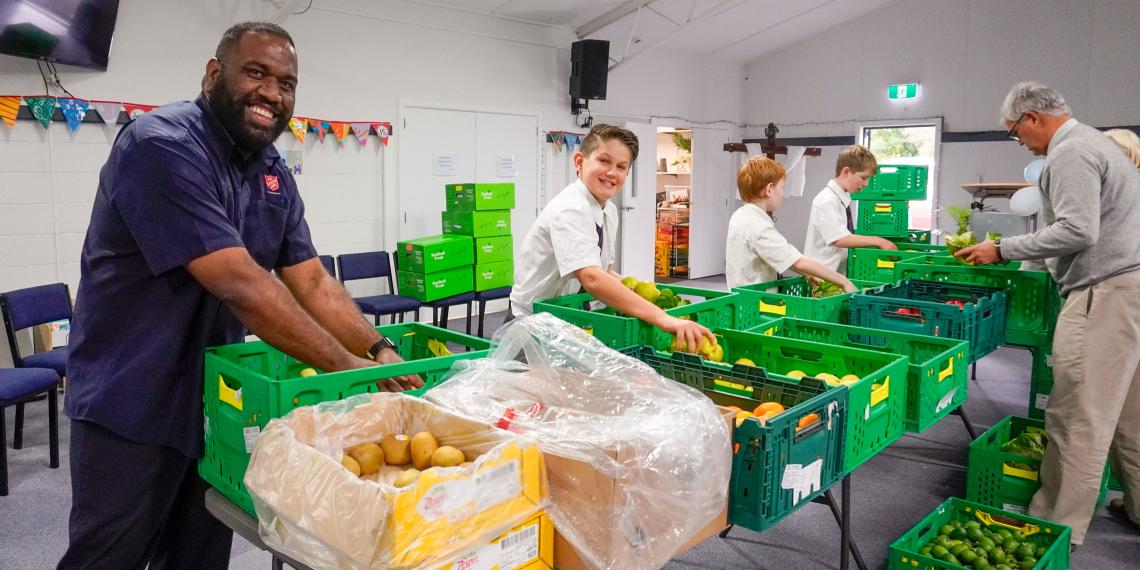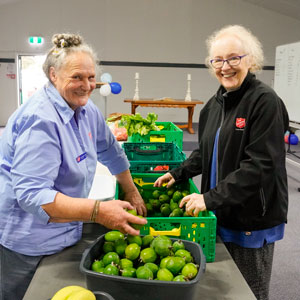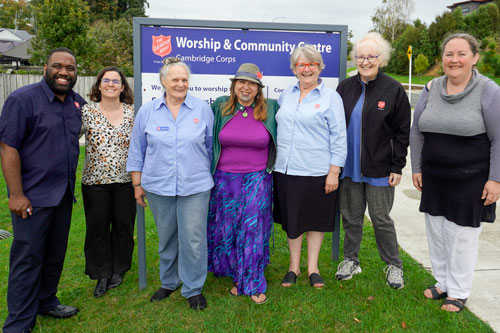Small Great Things

The Salvation Army in Cambridge is a small centre with limited resources, but that’s not stopping the team from doing great things with an abundance of love and intentionality. Te Kai Mākona, The Salvation Army’s new food security and sovereignty framework, has been enthusiastically embraced by the Cambridge team. And that includes local social agency partners, student volunteers from St Peter’s School, and the very generous wider Cambridge community.
The Salvation Army across the motu is working hard to embed a new food response kaupapa of support and connection with whānau and communities. Mākona means to be fully satisfied and have everything you need physically, emotionally, spiritually and socially. Our re-imagined approach seeks to achieve this end by working relationally with those we serve, empowering people to build on the strengths and capacity they already have and extending collaboration with community partners. Eligibility is no longer part of our practice, but rather the return of choice and agency to individuals and families. Te Kai Mākona offers a mana-enhancing shift in power, and the results are speaking for themselves in Cambridge.
The gift of choice
‘Food empowerment’ is a key component to the new food response framework, which means we now offer a range of additional food supports. One of those is ‘choosing kai’, and at Cambridge Salvation Army the new choice model supermarket is a big hit. Community Ministries Coordinator Julieanne Seath explains that the gift of choice helps people feel empowered and positive.
‘In a sense it’s just like going to the supermarket. People choose what they need, what they can cook and what they know they will use. And they often bring their own bags so when they go home it just looks like they have been to the supermarket rather than to The Salvation Army for help.’
Jenni Mahaffey has been volunteering in the Cambridge Salvation Army foodbank for over ten years and is loving the new approach.
‘Our foodbank used to be full of pre-packed boxes and people just got what they were given. One size fits all. Only it didn’t really. Nine times out of ten you knew you were giving people things they didn’t want or even actually need. Now there’s no food wastage. The new model gives people choice, and when you’re in a tight spot that means a lot.’
Te Kai Mākona has also gifted the team more time to listen. ‘The choice model has given us more opportunities to just be with people so things can become personal quickly. The connections are deeper,’ says Julieanne. ‘We do have fun with our clients now to, but if someone hasn’t eaten for the past few days, we can heat something up and sit down with them for a cuppa and listen.’
With dignity intact
 Another empowering food support growing in popularity is ‘buying kai’ through fruit and vegetable co-ops. The Salvation Army in Cambridge partners with Food Together, a social enterprise that exists to support local community organisations to connect people through nutritious and affordable food. Julieanne explains that co-op members simply go online and order what they want.
Another empowering food support growing in popularity is ‘buying kai’ through fruit and vegetable co-ops. The Salvation Army in Cambridge partners with Food Together, a social enterprise that exists to support local community organisations to connect people through nutritious and affordable food. Julieanne explains that co-op members simply go online and order what they want.
‘It’s tailored to their needs, and they pay for it, so their dignity is intact. One woman spent $40 on a box and then went home and got on the Countdown website to compare prices. She would have had to spend $80 there to get what she’d ordered. So we are totally behind this because it is so good for our people. It benefits everyone. And if there is ever anything left over, we can supply the foodbank and people can choose fresh fruit and vegetables.’
Food Together delivers produce in bulk to The Salvation Army in Cambridge once a week. But that’s not where the collaboration ends. ‘Partnering around kai’ is another food support strategy the small team at Cambridge employ to deliver collective impact. As a co-op distribution centre, the team need help weighing and packing the produce to fill the co-op members orders, and that’s where students from St Peter’s School come in.
Students of generosity
Some years ago, St Peter’s School adopted The Salvation Army as their charity of choice. Donations at Christmas time and mufti-day fundraisers were part of that long-term relationship. Now year seven and eight students willingly give up their lunchtime every Wednesday to weigh and pack the co-op orders.
‘St Peter’s is a prestigious school,’ says Centre Leader Lieutenant Ben Cola, ‘the year seven dean is passionate about the boys understanding their privilege and the responsibility that comes with that.’
Year eight student Ezekiel Mundy says that he feels ‘quite sick’ knowing some families struggle to buy healthy food. ‘Inflation has gone up seven percent in the last year and that’s a lot of money. And it’s pretty hard for people—harder than it’s been in 25 years. I reckon that by doing this we are making a difference in people’s lives.’
 Tommy Peters (year seven) adds ‘It’s great helping out because it’s good to know that the community is coming together to help those who need it. I enjoy coming but it’s not how I feel about helping that matters—what matters is how the people getting healthy vegetables feel.’
Tommy Peters (year seven) adds ‘It’s great helping out because it’s good to know that the community is coming together to help those who need it. I enjoy coming but it’s not how I feel about helping that matters—what matters is how the people getting healthy vegetables feel.’
‘They are real participants in this,’ says Julieanne. ‘And their contribution shows genuine generosity.’
Paying it forward
Cambridge Salvation Army is blessed to be part of a very generous community. ‘We have a couple who call every month to see what we need specifically, and then they arrive with $500 worth of that product. That’s a lot of money in today’s economy,’ says a grateful Julieanne. ‘And it’s not just wealthy people who want to pay it forward, it’s also clients. Many have the attitude of “you helped me when I was doing it tough so now, I want to pay it forward and help someone else by donating”. It’s beautiful.’
Bubbling up from Te Kai Mākona seems to be an increasing desire for collaboration and connection across the community. ‘It’s not just The Salvation Army helping people in our community,’ says Ben. ‘There are other amazing social agencies out there for us to be working with because we all want to see our community thrive.’
Julieanne agrees emphatically. ‘Working together and using each other’s strengths and not trying to compete by having five foodbanks in the one community, well you’ll only ever run at 45% if the community is spread that thin. Whereas if you build relationships and discuss strategies, our networks for referral are stronger and what we can do together is greater.’
The Salvation Army Cambridge is a wonderful example of a small centre strongly connected to its community and therefore able to respond strategically and intentionally to meet local need in meaningful ways. Small but great things are happening in and through the shift to Te Kai Mākona!
